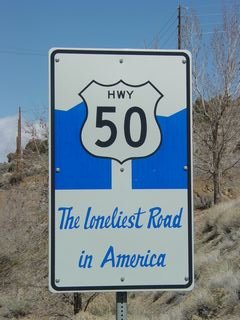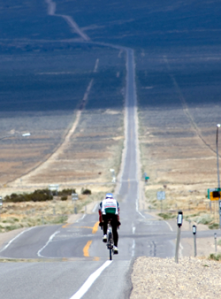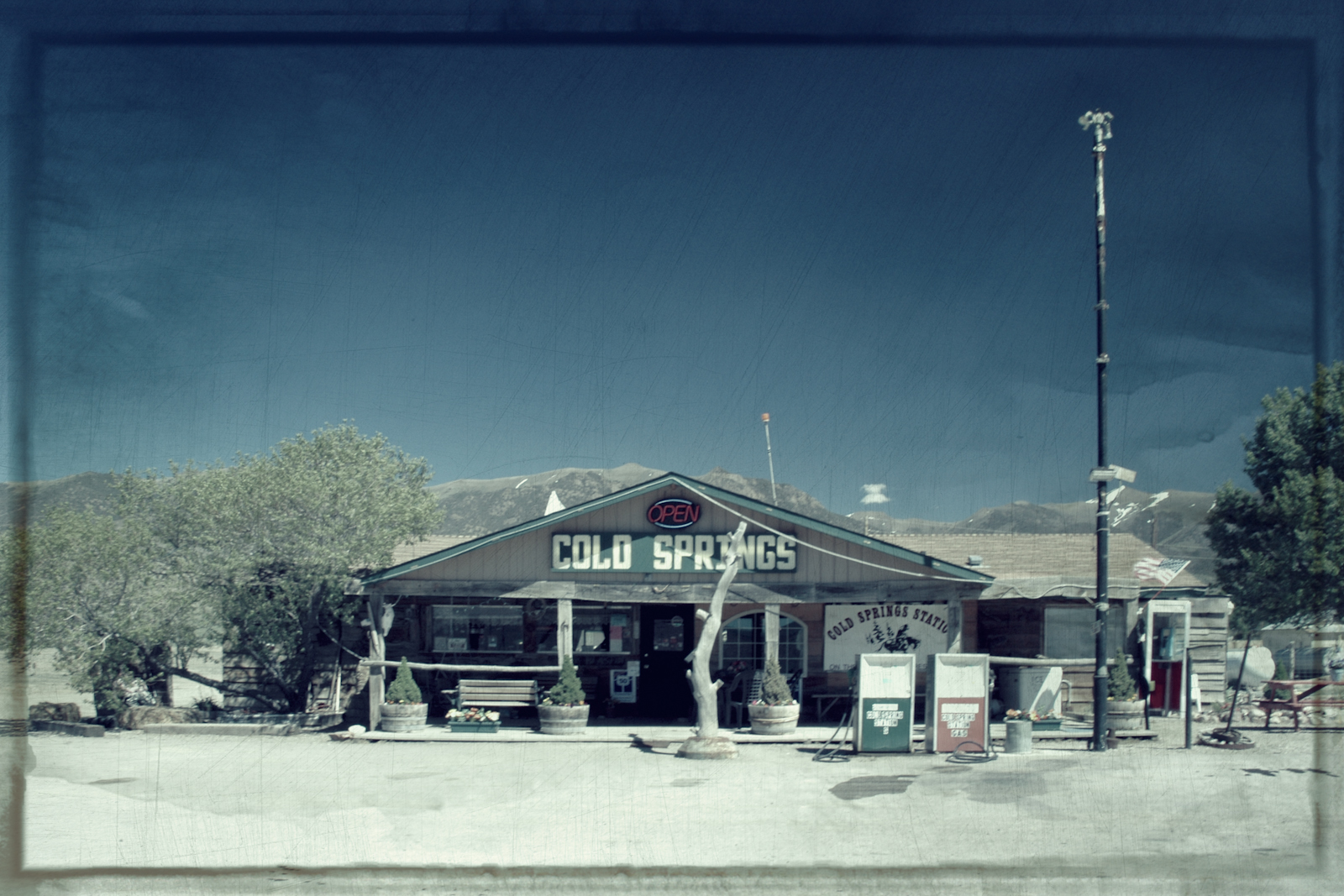Route 50 ~ Loneliest road in America
 Route 50 through Nevada is lonely any time of the year, but in March it’s particularly desolate. On our left the White Pine Mountains of Humboldt National Forest guarded us, followed by the Monitor and Toquima ranges, and then the Shoshone and Toiyabe Mountains, snowy sentinels that kept their distance. On the right, hills gave way to windblown fields of swirling snow that swept across the straight road. I worried that the Bug was running without snow tires, but Harry kept up the pace.
Route 50 through Nevada is lonely any time of the year, but in March it’s particularly desolate. On our left the White Pine Mountains of Humboldt National Forest guarded us, followed by the Monitor and Toquima ranges, and then the Shoshone and Toiyabe Mountains, snowy sentinels that kept their distance. On the right, hills gave way to windblown fields of swirling snow that swept across the straight road. I worried that the Bug was running without snow tires, but Harry kept up the pace.
Named “the loneliest road in America,” Route 50 cuts straight through Sevier Desert and looks like the Australian outback except for Notch Mountain rising 9,655 feet in the distance. There was no cell phone reception and we hadn’t had wifi since Boulder. I turned off my phone.
I drove while Harry listened to books on CD and dozed. The dashboard read a cold forty degrees outside with a strong wind, but the sun was bright. High clouds brushed the wide sky that mirrored the Bug’s faded denim blue. Every twenty miles the landscape changed—from flat to buttes to majestic peaks to steep passes cut through the rocks. Always the land demanded respect. On one stretch we came up behind a van, its lights flashing and hardly moving. There was no traffic to consider as I passed. Ahead of the van, a solitary biker was pedaling for all he was worth toward a distant mountain pass maybe forty miles away. There was no place to stop or even pull over without getting stuck in desert sand.
“What in the world?” I said.
Harry woke up. “Biking cross country,” he offered.
“Then thank goodness for the sag wagon.” To me it seemed a torturous undertaking, and I felt gratitude once again for the four Bug wheels under me.
At noon Harry took over driving. We passed rock mounds sculpted by the wind to look like macramé, and around a bend the vista opened to distant snow-covered peaks. Ahead of us, the pass at Wheeler Peak was higher than thirteen thousand feet. The Bug had its work cut out for it. He pressed the gas pedal, and we started up on faith fueled by diesel and German technology.
Somewhere in the middle of nowhere, which was everywhere around us, Harry said, “I forgot to get gas.”
I could see that the fuel light was on. Trying to control the panic in my voice, I asked, “How much do we have?”
“The gauge says forty-five miles.”
“That’s it? Forty-five? There’s nothing out here. Nothing!”
At about that moment we passed a sign that read, “Next service forty miles.”
“‘E’ does not stand for ‘enough,’” I grumbled. Harry said nothing. He had messed up, and I suspected he was calling on his natural good luck to see us through.
Even if we made it to the service stop, it would be a miracle to find diesel gas. On the other hand, didn’t farm vehicles use diesel? And trucks, too? I recalled seeing a big truck a while back.
The last station we passed was over an hour earlier, and I knew we’d never make it backtracking sixty miles. But I tried not to worry. Out the window a single-wire fence ran alongside us, keeping in invisible cattle or horses or maybe snow. I thought about tossing things out to lighten the load. What would go? Not the lamp we were delivering and which took up two large boxes of space. Harry had packed several coats to cushion the lamp, but they didn’t weigh much and besides, we might need the coats if we got stuck.
“What’s the temperature?” I asked.
He looked at the digital reading on the dashboard.
“Thirty.”
“That’s pretty cold.” I tried to sound lighthearted, but mentally I was calculating the wind chill, putting us somewhere in the low twenties. I started to shiver.
If the Bug hit empty, Harry would have to hitchhike to the station. On the other hand, if the gauge was correct, we might be within five miles of the station by then. He could walk if he couldn’t get a ride. I’d wait in the Bug, of course, out of the cold and wind. I had the coats and a sleeping bag. I had a camping stove and water, a coffee pot and coffee. I had some food—crackers and a couple energy bars. I could survive.
 One of the differences between Harry and me is that I fret about what might happen in the coming hours, days, years. He doesn’t think about the future or the past. For him, we were in a warm car and we were moving forward. We’d deal with running out of gas when—and if—we ran out of gas.
One of the differences between Harry and me is that I fret about what might happen in the coming hours, days, years. He doesn’t think about the future or the past. For him, we were in a warm car and we were moving forward. We’d deal with running out of gas when—and if—we ran out of gas.
I tried not to blame him. This trip was a partnership. I could have asked if we needed gas before we set out on the loneliest road. I could have leaned over and checked the gauge myself. I could have been easy-breezy about it and said something like, “Wouldn’t want to run out of gas on that road, would we?” Or, “Are we all set and gassed up to go?” But no—over twenty-five years of marriage I’ve come to trust him to take care of things like keeping gas in the car. Up until now he has never let me down.
We drove along in silence. There were few other cars. It suddenly occurred to me that if we ran out of gas, Harry might insist I hitch to the station because a car would pick up a woman before it would stop for a tall man huddled in a bulky coat. And if either one of us got to the station and managed to find a gallon of diesel, then there was the ordeal of hitching back to the Bug. But here I was worrying about the future again
I held my breath. I meditated. I felt hot and wanted to roll down the window, but I figured that would increase wind resistance and lower the gas mileage. So I kept the window rolled up and turned down the heat. Harry turned it back up.
Every now and then a sign counted down the miles to the station. Thirty. Twenty. Twelve. I wanted to ask how many miles the Bug registered left in the tank, but what was the point?
Finally, like an oasis in a frozen desert, a station came into view on the left. H slowed down and pulled in. The blacktop was a mess of deep slush no one had bothered to plow. To my great relief, there was diesel fuel, but it was over four dollars a gallon. No matter—I would gladly have paid twice that.
While Harry filled the tank, I went into the convenience store. There was a counter with stools where one lone man sat drinking coffee. A woman—the proprietor, she seemed to be—stood behind the counter and refilled his cup. Coffee sounded good about then. While she poured me a cup to go, I said, “I’m so glad you’re here. We weren’t sure we had enough gas to make it.”
“I hear that a lot,” she said. She must have done a good business with truckers and easterners like us who don’t have the sense to fill up before starting the journey across Nevada.
 Harry came in all rosy-cheeked and cheerful.
Harry came in all rosy-cheeked and cheerful.
“We made it,” he said.
“Yes, we did. You knew we would, didn’t you?”
He laughed. “You might try having a little faith sometimes.” He didn’t say faith in what—the Bug, the diesel gas, or some higher power. As for me, what little faith I have is in my husband’s ability to turn potential disaster into happy relief.
Hahaha…that’s a great story. Harry can WILL things! Others would be hassling with any number of worse scenarios and I like the way you started calculating worst case scenarios, and gas saving ideas! I could go on but I have to get ready for work.
Thanks for the comment, Mr. Reynolds. Your brother definitely has strong, silent faith. He’s my guru.